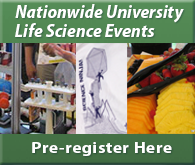Science Researcher Update: Spotlight on Meetings, Conferences, and Events
Tags: cancer research, Cancer, August, Bar Harbor, Maine, Life Sciences, 2017, Current Science Meetings and Events, August 2017
Spotlight on Science Meetings, Conferences and Events brings you information on the following: Global Chemical and Biochemical Engineering Meeting
Read MoreTags: USA, August, San Diego, 2017, Current Science Meetings and Events, Science Meetings and Events, August 2017, Biochemical, Chemical And Biochemical Engineering, Chemical
Spotlight on Science Meetings, Conferences and Events brings you information on the following: World Congress on Dental and Oral Health
Read MoreTags: Nevada, USA, April, 2017, Current Science Meetings and Events, April 2017, Science Meetings and Events, Los Vegas, Dental and Oral Health
Spotlight on Science Meetings, Conferences and Events brings you information on the following: Brains, Minds and Machines to be held on 8/13/17 - 9/3/17
The goal of this course is to help produce a community of leaders that is equally knowledgeable in neuroscience, cognitive science, and computer science and will lead the development of true biologically inspired AI.
The class discussions will cover a range of topics, including:
- Neuroscience: neurons and models
- Computational vision
- Biological vision
- Machine learning
- Bayesian inference
- Planning and motor control
- Memory
- Social cognition
- Inverse problems & well-posedness
- Audition and speech processing
- Natural language processing
These discussions will be complemented in the first week by MathCamps and NeuroCamps, to refresh the necessary background. Throughout the course, students will participate in workshops and tutorials to gain hands-on experience with these topics.
Core presentations will be given jointly by neuroscientists, cognitive scientists, and computer scientists. Lectures will be followed by afternoons of computational labs, with additional evening research seminars. To reinforce the theme of collaboration between (computer science + math) and (neuroscience + cognitive science), exercises and projects often will be performed in teams that combine students with both backgrounds.
The course will culminate with student presentations of their projects. These projects provide the opportunity for students to work closely with the resident faculty, to develop ideas that grow out of the lectures and seminars, and to connect these ideas with problems from the students’ own research at their home institutions.
This course aims to cross-educate computer engineers and neuroscientists; it is appropriate for graduate students, postdocs, and faculty in computer science or neuroscience. Students are expected to have a strong background in one discipline (such as neurobiology, physics, engineering, and mathematics). Our goal is to develop the science and the technology of intelligence and to help train a new generation of scientists that will leverage the progress in neuroscience, cognitive science, and computer science. The course is limited to 30 students.
Tags: Massachusetts, Biology, August, Woods Hole, Computational Biology, Neuroscience, Life Sciences, Life Science, 2017, Current Science Meetings and Events, August 2017
Spotlight on Science Meetings, Conferences and Events brings you information on the following: Annual R&D Process Excellence Summit to be held on 8/10/17 - 8/11/17
Curtis and Wyss provide business opportunities to a target audience of executives, investors, leaders and thinkers who share the goal of making deals happen in the world’s most liquid markets.
Key Practical Learning Points of the Summit:
- Mega trends, Big Data Analysis and Interpretation
- Design Thinking, Creativity and Innovation Culture
- R&D effectiveness in a changing and highly demanding world
- Voice of Customer- aligning the decisions on Front End Innovation achievement with customer’s needs
- Opting for relevant KPIs and how they impact company’s performance
- Management of R&D teams in terms of retaining talents, career evolution and recruitment
- Knowledge Management ( generation, use, dissemination, store...)
- Effective product creation process and product lifecycle management, Lean Product Development
- Integrating R&D with business departments to generate innovations
- How to achieve competitive advantage through systematic market analysis?
- How to use analytics and big data to develop products and drive innovation?
- Open and Outsourced Innovation Frameworks
- R&D portfolio optimisation and its alignment with your company business strategy
- Partnerships between large companies and start-ups
- Examining success stories in R&D efficiency: sharing your company experience
Tags: Massachusetts, August, Summit, Boston, Research, 2017, Current Science Meetings and Events, August 2017
Spotlight on Science Meetings, Conferences and Events brings you information on the following: 4th Life Science Knowledge Management Summit to be held on 8/9/17 - 8/10/17
The landmark Life Science Knowledge Management Summit is the only conference expressly tailored to suit the needs of the life science industry. Our program will address the particular strategic needs of R&D, clinical research, regulatory affairs, marketing, commercial, and other particular business functions inherent to the business of medical device, biotech and pharmaceutical companies. The industry leading executives, decision makers, KM stewards and leaders from disparate business units comprise our speaking faculty.
Top Reasons to Attend:
- Conduct targeted analysis to gain business insights that inform decisions and strategic planning
- Build and develop cross-functional teams to design, implement and govern KM systems
- Integrate systems in times of transition and eliminate information silos across business functions
- Foster a collaborative culture of achievement and innovation with maximum engagement
- Develop quantitative analysis software for statistical simulation, decision support and analysis
- Ensure data security and integrity in cloud-based systems
Tags: Pharmacology, Massachusetts, August, Clinical Research, Summit, Boston, Biotechnology, Life Science, 2017, Current Science Meetings and Events, August 2017, Pharmaceutical research
Spotlight on Science Meetings, Conferences and Events brings you information on the following: A Systematic Approach to Medically Unexplained Symptoms to be held on 8/9/17 - 8/12/17
This course will provide a diagnostic framework/template for chronic functionally-based conditions with shared etiologies and presentations. Subsequently, more specific management strategies for each condition will be provided, along with various clinical pearls. The program will attempt to cover various functionally-based conditions seen throughout the scope of internal medicine, selecting from a variety of pertinent general and subspecialty-derived conditions. Expert faculty will present evidence and case-based clinical approaches.
Learning Objectives:
Upon conclusion of this program, participants should be able to:
Summarize a general framework/construct regarding the approach to chronic symptoms.
Integrate a cost-effective and efficient diagnostic methodology in the care of chronic symptoms.
Describe updates in the treatment of irritable bowel syndrome.
Review management strategies in chronic headache conditions.
Describe therapeutic options for chronic subjective dizziness.
Tags: California, August, Life Sciences, Conference, 2017, Current Science Meetings and Events, August 2017, Internal Medicine
Spotlight on Science Meetings, Conferences and Events brings you information on the following: Annual Summit on Sexual & Reproductive Health
Read MoreTags: USA, Georgia, October, Atlanta, 2017, Current Science Meetings and Events, Science Meetings and Events, October 2017, Sexual and Reproductive Health
Spotlight on Science Meetings, Conferences and Events brings you information on the following: 8th International Conference on Dementia and Dementia Care
Read MoreTags: September, Dublin, Ireland, 2017, Current Science Meetings and Events, Septeber 2017, Science Meetings and Events, Dementia, Dementia Care
Spotlight on Science Meetings, Conferences and Events brings you information on the following: NYU Nature Conference on Neurogenetics to be held on 8/9/17 - 8/11/17
The application of genetic and genomic approaches to neuroscientific questions is poised to rapidly advance our understanding of how genes influence brain function and disease risk. Recent technological developments in genetics now allow the large scale cataloguing of genetic variation, from common and rare single nucleotide changes to non-coding, regulatory mutations, and how these are related to health and disease. In neuroscience, new tools for monitoring and manipulating neuronal activity, circumscribed circuits and specific cell types allow interrogating the mechanisms of perception, cognition and action. Despite advances on both fronts, there still remains a significant gap between genetics and neuroscience, limiting the potential for this exciting and important area of research to provide new neurobiological insights. The goal of this Nature Conference is to bridge the gap between neuroscientists and geneticists and provide a forum for discussing recent advances and innovative strategies for future research in neurogenetics. The conference will cover the breadth of neurogenetics—from genome-wide association studies for complex psychiatric disorders to mechanistic investigations of genes underlying behavioral traits in model organisms. We hope that this conference will be the first of many and will facilitate interdisciplinary collaborations aimed at developing a more integrated understanding of how genes influence behavior, neuronal development and neurological disease.
Tags: New York, August, Neuroscience, Life Sciences, Conference, Genetics, Research, New York City, 2017, August 2017








